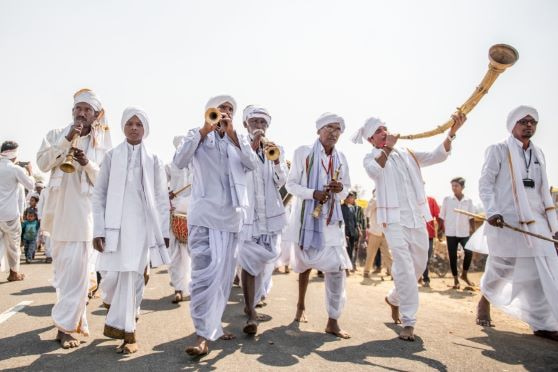IIT Hyderabad steps up to preserve Dokra as a heritage craft


Deepak John Mathew, Department of Design and the Indian Institute of Technology (IIT) Hyderabad, along with his team conducted a design intervention workshop on Dokra crafts of Ojha Gonds of Adilabad.
The initiative was part of an ongoing project under Mathew’s supervision “Tangible and Intangible Cultural Heritage of Telangana”, supported by the Science and Heritage Research Initiative Programme, Design Innovation Centre, and Institutional Innovation Centre IIT Hyderabad.
The workshop was focusing on training the younger generations of the Ojha community in the traditional Dokra crafts under the supervision and training of the master craftsman. Traditionally the artefacts were majorly created for ritualistic purposes, which is a part of the intangible cultural heritage of the Raj Gonds of Telangana.
The workshop aimed at retaining and sustaining the traditional craft practices of the Ojha’s and to provide them opportunities to generate livelihood from their ancestral occupation of the craft.
The workshop also had an objective of community building, and peer learning, skill development, and training. Thus, the master craftsman was chosen from the Ojha community itself.
One more aspect of the workshop is to create a digital repository of all the artefacts created in the workshop by using photogrammetry and 3D digital printing which will be useful for the researchers for further studies as well as for the visitors from all over the world to get insights in the cultural heritage of the Raj Gonds and associated communities and their traditional practices.
The digital museum is being intended from the workshop to preserve the traditional artifacts with the non-destructive methods where the original artifacts will remain with the community and 3D printed artifacts will be served to fulfil the Knowledge sharing purpose on the cultural heritage of telangana on the global level, where the museum can be visited virtually from anywhere in the World.
Highlights:
“We define IITH as “Inventing and Innovating in Technology for Humanity”. Preserving Dokra and encouraging future generations to sustain it fulfils our motto. IITH also has a Rural Development Centre to uplift the rural livelihood with the aid of technology,” said B.S Murty, director, IIT Hyderabad.
The workshop was intended to revive the traditional “Whojari Kala” (literally translates art of the Ojha Community) and encourage younger generations of the Ojha families to adopt the traditional occupation by providing design intervention through the workshop. It will also facilitate the creation of products that can fulfil the market’s needs; thus, our traditional crafts can provide sustainable livelihood to the Community, said master craftsman, Uika Inderjeet.
Speaking about the project, Krishna Trivedi, PhD scholar, Department of Design, said, “Raj Gonds are one of the oldest indigenous communities of India, the Ojha Gonds are associated with the Raj Gonds by providing Dokra artefacts for ritualistic, utilitarian and decorative needs of the community, which is gradually declining due to the lack of the patronage and with the adaptation of industrial goods, thus, systematic documentation, preservation, and safeguarding of the craft’s practices is important and crucial.
Furthermore, the workshop attracted the attention of the local visitors who visited and had an interactive session with the craftsmen. The workshop also served the purpose of community building and awareness generation regarding the cultural heritage and practices of the Ojha Gonds.